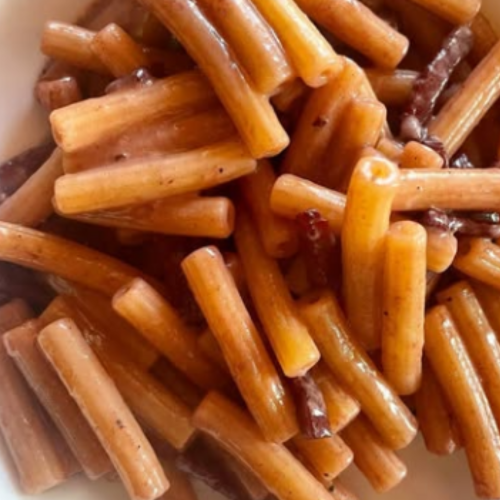Method:
Cook the Pasta: Bring a large pot of salted water to a boil. Add the pasta and cook until al dente, typically 8-10 minutes (or as per the package instructions). Drain, reserving a cup of pasta water for later.
Infuse the Pasta with Wine: While the pasta is cooking, heat the olive oil in a large skillet over medium heat. Once hot, add the drained pasta to the pan. Gradually pour in the red wine, about 1/2 cup at a time, stirring constantly to allow the pasta to absorb the wine.
Finishing Touches: As the wine is absorbed, continue to stir the pasta. Once most of the wine has been absorbed (after about 10 minutes), add the grated cheese and mix until creamy and well combined. If the pasta seems dry, add a little reserved pasta water to achieve the desired consistency.
Serve and Garnish: Serve the pasta hot, garnished with freshly chopped parsley and a drizzle of olive oil. Optionally, add a little more grated cheese on top for extra flavor.
Variations:
Cheese Variations: If you’re looking for a different flavor profile, try using a mix of Parmigiano-Reggiano and Pecorino Romano, or even a smoked cheese like Scamorza for an added twist.
Vegetarian Option: Skip any meat additions and focus solely on the wine, cheese, and herbs for a vegetarian delight.
Meat Option: You could add sautéed sausage or pancetta to the dish for extra richness.
Tips & Substitutions:
Wine Selection: Choose a good-quality dry red wine for the best results. A wine that is too sweet or too full-bodied may overpower the dish.
Cheese: For a dairy-free version, you can substitute the cheese with nutritional yeast or a plant-based cheese.
Gluten-Free Option: Use gluten-free pasta if you need a gluten-free version of the dish.
